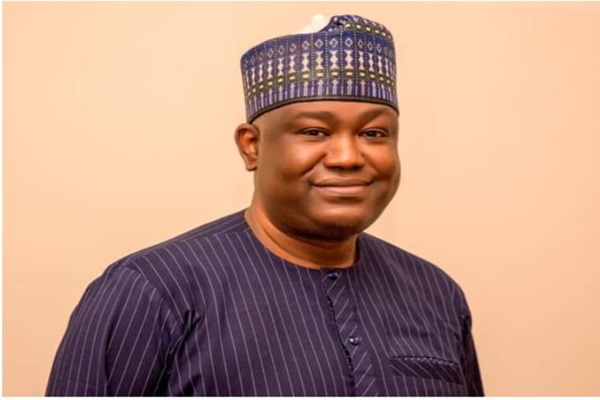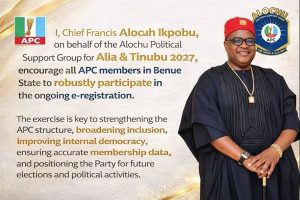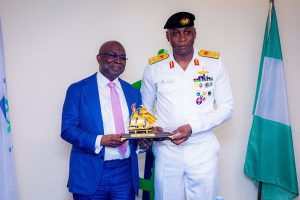By Tony Iji
Dr. Gbenga Olawepo-Hashim, in a literal sense, lives his life for others – and the society. In his 56-year sojourn on earth, he has committed his resources – treasure, talent and time – to the service of indigent people, communities, worthy causes and his country, Nigeria. He has sacrificed personal freedom in order to set the oppressed free. Those who chart this path to life are men and women imbued with a sharp vision, intelligence, diligence and resilience; the heart to give, a generous dose of patriotism, selflessness and the courage to dare. Gbenga Olawepo-Hashim, who came to national limelight in his political heydays as the Deputy National Publicity Secretary of the then Nigeria’s ruling Peoples Democratic Party (PDP), possesses all these attributes that have earned him a place in both detention cells and Rolls of Honour. Little wonder, those who know him closely draw a parallel between his life and that of the legendary and iconic Nelson Mandela, the man who liberated South Africa from the claws of apartheid and became its first popularly elected President.
That comparison came powerfully to life during Olawepo-Hashim’s 55th birthday celebration last year in Barcelona, Spain, when a preserved personal letter of the late President Nelson Mandela, bought by the Nigerian’s friends at an auction, was presented to him. The birthday gift did not only bring to mind the resemblance between the lives of Mandela and Olawepo-Hashim, it also evoked the memories of the latter’s practical contributions to the former’s efforts towards South Africa’s freedom from apartheid rule and the bruises he sustained in the hands of those in power and positions of authority. As a student, Olawepo-Hashim was an anti-apartheid activist, a role that led him and three other student leaders of the university into detention in over-crowded Police cells in Lagos in 1987 following an anti-apartheid protest.
He was again detained in September 1989 in solitary confinement under the Security Detention of Persons Decree 2. His trial and that of his colleague- Gbenga Komolafe and Gbenga Olawepo Vs Attorney General of the Federation became a landmark case on the notorious Decree 2 as the Hon. Justice Tajudeen Odunowo assumed jurisdiction in the case arising from the Decree for the first time in Nigeria. The university authorities later seized his certificate for five years when he gratuated. He had to depend on his skills to survive. Ironically, when civil rule was restored in 1999, and he became a member of the then ruling Peoples Democratic Party (PDP), his push for more democratic reforms along with other compatriots met a brickwall.
Testifying to Olawepo-Hashim’s courage, deep patriotism, and selflessness, the late Chief Ojo Maduekwe, former PDP National Chairman, former Nigerian Foreign affairs Minister and Nigerian High Commissioner to Canada, had this to say at a reception in 2005: “The lives of people like Gbenga should inspire us to speak well of ourselves. Olawepo-Hashim is an inner driven person, not afraid to stand alone, not afraid to be unpopular, not afraid to hold a view. A man who is inner driven, listens to the music of his own universe, listens to the applause of the spirit inside that have etched out an horizon, which he must conquer and moving in that direction; he takes the lead and others follow. Who can see the horizon with him, of such is the stuff of history, of such is the stuff of greatness.”
Born in Yelwa, Yauri, Kebbi State by a Yoruba mother to a Hausa father, Olawepo-Hashim spent his early years in New-Bussa, Niger State and was raised in the family of his step-father. A Christian, he attended NEPA Junior Staff School, New Bussa; Cherubim and Seraphim College, Ilorin; School of Basic Studies, Ilorin; University of Lagos; and University of Buckingham, United Kingdom. Here he obtained a Masters Degree in Global Affairs and was best student in his cohort, securing the Max Bellof Prize for Global Affairs. He was also the first student to obtain a distinction in the department course – History of the international systems.
In a letter of commendation to Gbenga on the Max Bellof prize he won, the chairman of the International Studies Degree Programmes, M.J.M. Crostie wrote: “It is always pleasant to dwell on success and you should make a point of mentioning the prize in your curriculum vitae because it is this sort of distinction that will set you apart from other candidates.” He also received training in International Petroleum Management at the International Human Resources Development Centre – Boston Massachuset, United States.
Olawepo-Hashim started manifesting his leadership qualities from his elementary and secondary school days. In Cherubim and Seraphim College, Ilorin, he was appointed Health Prefect and elected President of the Dramatic Society. At the School of Basic Studies, he was elected General Secretary of the Anti-Apartheid Association, Youth Solidarity on Southern Africa. That was when he was incarcerated under the Detention of Persons Decree 2 of 1984 (as amended in 1989), as a result of his leadership role in 1989 Anti-SAP protests, and his Pro-Democracy activities. The Amnesty International adopted him Prisoner of Conscience for Nigeria in 1989. In 1988, he was elected one of the leaders of the National Association of Nigeria Students (NANS). He was also a notable pro-democracy figure in the then Global pro-democracy resistance of the late ‘80s and a respected youth leadership voice from Africa. He played a prominent role in the 13th International Festival of Youths and Students in 1989 in Pyongyang North Korea. He participated in the International Peace Trek at the Demarcation line between North and South Korea in July 1989.
An activist, politician, businessman and philantropist, Olawepo-Hashim has, over the years, built a reputation for greatness in the private sector and the polity – indeed, in all spheres of endeavour where he got involved. For him, politics began in 1990 when he became the National Administrative Secretary of the National Consultative Forum, led by the fiery legal luminary, former President of the Nigerian Bar Association, Mr. Alao Aka-Bashorun. The group had in its fold technocrats such as Alhaji Danshida, Tayo Akpata, Philip Asiodu, etc. It also had a political group made up of former Zikist activists, including Chief Kola Balogun, Chief RBK Okafor, Mahmud Waziri and Alhaji Tanko Yakasai. The group was the first to advocate for devolution of power and the convocation of a national conference under the military rule.
His mentors in partisan politics were the late Chief Solomon Lar and Alhaji Abubakar Rimi. In 1998, working closely under the supervision of Professor Jerry Gana (Secretary), Olawepo-Hashim and two other young political leaders – the late Senator Dahiru Ahwesu Khuta (Administration) and Dubem Onyia (Organization) – helped in the years of the G-34 initiative for the formation of political parties at the group’s secretariat.

During the transitional period, following the election of President Olusegun Obasanjo in 1999 on the platform of his party (PDP), Olawepo-Hashim served as member/Secretary Youth and Women Development Sub-Committee of the General T.Y. Danjuma Policy Advisory Committee with Late Hajia Laila Dogonyaro as chairman of the Youth and Women Sub-committee. In the same year, Olawepo-Hashim was elected as the first Deputy National Publicity Secretary of the party. He was a highly influential national officer and became the founding chairman of the Group of 54 NEC members. The group had Dr. Chris Ngige as Secretary and Alhaji Ahmed Gusau, former Minister of Mines, as Deputy chairman. He was known for his commitment to the principle of internal democracy in the party, transparency and good governance. As a national officer, he spoke truth to power then at great risks.
In 2003, Olawepo-Hashim was appointed as a member of the Political Advisory Committee to the President (Office of the Political Adviser). He resigned from PDP in 2006 and became one of the founders and National Publicity Secretary of the National Democratic Party. He was a member of the party’s national caucus and governorship candidate in Kwara State in 2007. NDP did well in Kwara, Delta, Sokoto and Plateau states, largely due to his influence.
Even as he engaged in top-level national politics, Olawepo-Hashim has also been a dominant player on the business front for the past three decades. He is the chairman of Oilworld Ltd., operator of OPL 241 in the continental shelf of Nigeria as well as chairman Transnational Energy Limited, farmee of Hely Creek and Abigborodo fields on OML 49. He is the chairman of Bresson A.S. Limited, owners of the 90mw Magboro Independent Power Producing (IPP) project.
Recently, a video of Olawepo-Hashim discussing his ambitious economic plan for Nigeria in 2018 ahead of the 2019 election, in which he was a presidential candidate, resurfaced online, highlighting his deep understanding of the country’s economic challenges and his strategic vision for national growth. In it, Olawepo-Hashim outlined a bold strategy aimed at expanding and diversifying Nigeria’s economy to achieve a minimum Gross Domestic Product (GDP) of $4 trillion within a decade. His economic blueprint emphasized reducing Nigeria’s dependence on oil, leveraging the country’s vast agricultural and solid mineral resources, and boosting industrialization.
“The key to Nigeria’s economic transformation is integrating agriculture and mineral resources with manufacturing. We must create an industrial base that contributes at least 40% to GDP, which will in turn generate millions of well-paying jobs,” Olawepo-Hashim stated in the video.
He also highlighted the need to improve Nigeria’s business environment by removing bureaucratic bottlenecks and ensuring policies that attract foreign and domestic investments. His economic plan proposed major infrastructural investments, power sector reforms, and policies that would enhance the ease of doing business. Many viewers of the video are beginning to take a deeper look at his ideas and to praise his foresight, especially in light of Nigeria’s current economic struggles, including high inflation, unemployment, and a weakening currency. Some Nigerians have even begun to express regret that such a comprehensive vision was not considered for implementation at the time. With this renewed interest in his economic plan, some political analysts suggest that his vision could still serve as a model for Nigeria’s economic revival.
Leveraging his natural propensity to give as well as his successes in business and politics, Olawepo-Hashim has built for himself the reputation of a frontline philanthropist. Ploughing back to society has been a pastime for him. He gives out scholarships to many just as he also empowers thousands with his digital training skills. In 2003, Olawepo-Hashim supported the resettlement of Liberian students in Ghana by supporting the All African Students initiative with thousands of Euros.
His foundation, the Gbenga Hashim Foundation, disbursed N100 million in grants to small businesses in Kwara State and the Federal Capital Territory (FCT), Abuja, in 2024, aimed at strengthening grassroots economic development. He has built drainages, constructed and graded roads for different communities. His N200billion Mogboro Power plant in Ogun State is also set to supply 24-hour electricity to Mogboro, Mowe, and Ibafo areas of Ogun State in partnership with Ibadan Electricity Distribution Company (IBEDC).
Olawepo-Hashim’s outstanding contributions to the development of the country have earned him many honours, including The Kwame Nkrumah African Leadership Award conferred by the continental student body – All African Student Union, at Accra Ghana in 2003; The Veteran Award in 2005 by the International Union of Students and World Federation of Democratic Youths, (WFDY). He has also received the 2000 Nigerian Union of Journalist Award for Professional Excellence. He is a fellow of the Institute of Corporate Administration.
Olawepo-Hashim, the bridge builder, complete detribalizer, charismatic leader and excellent negotiator, who celebrated his 56th birthday on June 28, is just ripe for bigger responsibilities and more purposeful leadership. His knowledge and experience of the economy and national politics at the highest level will, no doubt, come handy in forging national consensus and unity for Nigeria at this turbulent moment in its history






